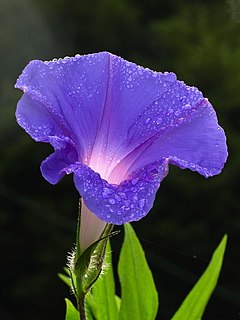
Morning glory is the common name for over 1,000 species of flowering plants in the family Convolvulaceae, whose current taxonomy and systematics are in flux. Morning glory species belong to many genera, some of which are:

Calystegia is a genus of about 25 species of flowering plants in the bindweed family Convolvulaceae. The genus has a cosmopolitan distribution in temperate and subtropical regions, but with half of the species endemic to California. They are annual or herbaceous perennial twining vines growing 1–5 m tall, with spirally arranged leaves. The flowers are trumpet-shaped, 3–10 cm diameter, white or pink, with a sometimes inflated basal epicalyx.

Fremontodendron californicum, with the common names California flannelbush, California fremontia, and flannel bush, is a flowering shrub native to diverse habitats in southwestern North America.

Calystegia sepium is a species of flowering plant in the family Convolvulaceae. It has a subcosmopolitan distribution throughout temperate regions of the North and South hemispheres.

Convolvulus arvensis, the field bindweed, is a species of bindweed that is rhizomatous and is in the morning glory family (Convolvulaceae), native to Europe and Asia. It is a climbing or creeping herbaceous perennial plant with stems growing to 0.5–2 metres in length, usually found at ground level, with small, white and pink flowers.

The morning glory Calystegia soldanella is a species of bindweed known by various common names such as sea bindweed, seashore false bindweed, shore bindweed, shore convolvulus and beach morning glory.
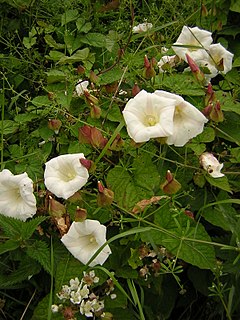
The morning glory Calystegia silvatica is known by the common name giant bindweed or large bindweed. It is the largest species of bindweed and is a strong rampant climber.
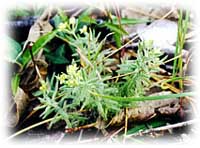
Galium californicum is a species of flowering plant in the coffee family known by the common name California bedstraw.
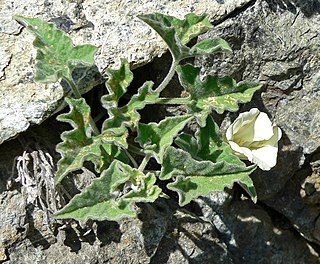
Calystegia collina is a species of morning glory known by the common name Coast Range false bindweed. It is endemic to the Coast Ranges of northern and central California, where it grows on slopes and in woodlands, often on serpentine soils.

Calystegia malacophylla is a species of morning glory known by the common name Sierra false bindweed . It is endemic to California, where it grows in several of the mountain ranges, including the Central Coast Ranges and the Sierra Nevada.

Calystegia longipes is a species of morning glory known by the common name Paiute false bindweed.

Calystegia occidentalis is a species of morning glory known by the common name chaparral false bindweed.

Calystegia purpurata is a species of morning glory known by the common name Pacific false bindweed.
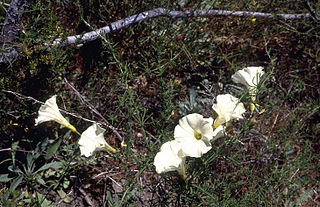
Calystegia stebbinsii is a rare species of morning glory known by the common name Stebbins' false bindweed. It is endemic to the Sierra Nevada foothills and the Tehachapi Mountains in Kern County, of California. It grows in unique habitat in chaparral on gabbro soils. It is a federally listed endangered species.
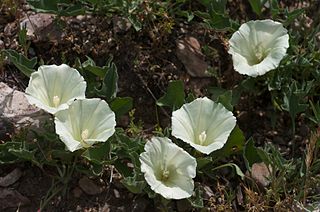
Calystegia subacaulis is a species of morning glory known by the common name hillside false bindweed.

Leptosiphon androsaceus is a species of flowering plant in the phlox family known by the common name false babystars.

Orobanche californica, known by the common name California broomrape, is a species of broomrape. It is a parasitic plant growing attached to the roots of other plants, usually members of the Asteraceae.

Populus fremontii, commonly known as Frémont's cottonwood, is a cottonwood native to riparian zones of the Southwestern United States and northern through central Mexico. It is one of three species in Populus sect. Aigeiros. The tree was named after 19th century American explorer and pathfinder John C. Frémont.

Sidalcea oregana is a species of flowering plant in the mallow family known by the common name Oregon checkerbloom.



















